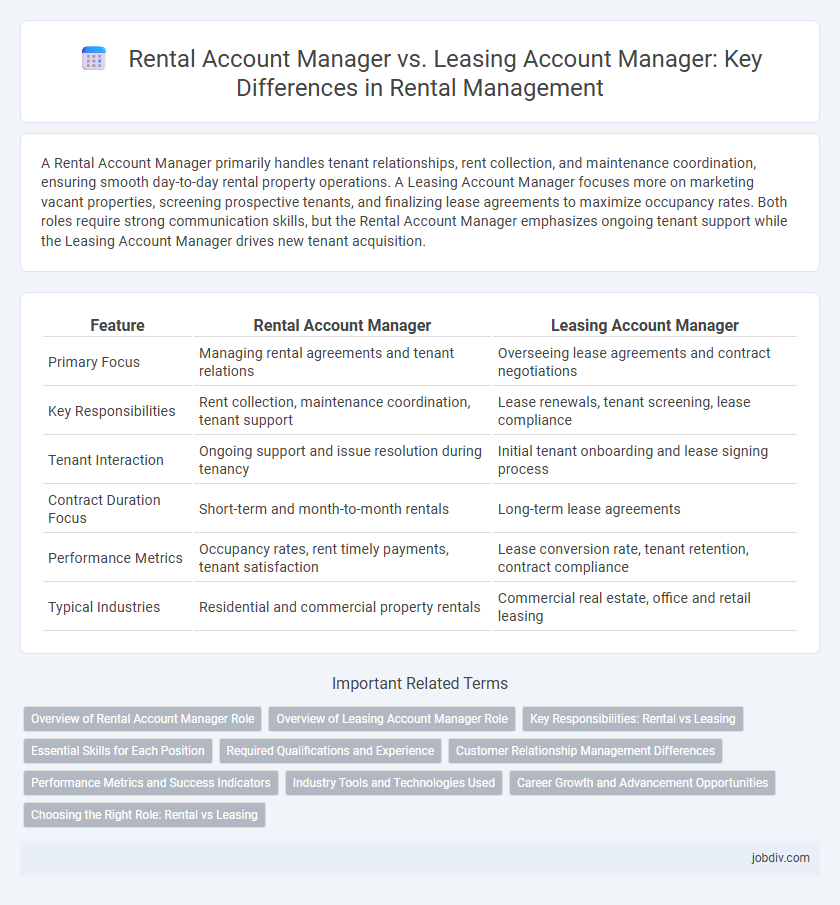A Rental Account Manager primarily handles tenant relationships, rent collection, and maintenance coordination, ensuring smooth day-to-day rental property operations. A Leasing Account Manager focuses more on marketing vacant properties, screening prospective tenants, and finalizing lease agreements to maximize occupancy rates. Both roles require strong communication skills, but the Rental Account Manager emphasizes ongoing tenant support while the Leasing Account Manager drives new tenant acquisition.
Table of Comparison
| Feature | Rental Account Manager | Leasing Account Manager |
|---|---|---|
| Primary Focus | Managing rental agreements and tenant relations | Overseeing lease agreements and contract negotiations |
| Key Responsibilities | Rent collection, maintenance coordination, tenant support | Lease renewals, tenant screening, lease compliance |
| Tenant Interaction | Ongoing support and issue resolution during tenancy | Initial tenant onboarding and lease signing process |
| Contract Duration Focus | Short-term and month-to-month rentals | Long-term lease agreements |
| Performance Metrics | Occupancy rates, rent timely payments, tenant satisfaction | Lease conversion rate, tenant retention, contract compliance |
| Typical Industries | Residential and commercial property rentals | Commercial real estate, office and retail leasing |
Overview of Rental Account Manager Role
A Rental Account Manager oversees rental agreements, tenant communications, and payment processing to ensure efficient property management. This role requires coordinating maintenance requests, resolving tenant concerns, and maintaining accurate rental records to optimize occupancy rates and revenue. Compared to a Leasing Account Manager, who focuses primarily on tenant acquisition and lease negotiations, the Rental Account Manager ensures ongoing tenant satisfaction and contract compliance throughout the rental term.
Overview of Leasing Account Manager Role
A Leasing Account Manager oversees tenant relations, lease negotiations, and property occupancy rates to maximize rental income and maintain high retention levels. They coordinate with property owners and maintenance teams to ensure smooth leasing operations while complying with legal and financial regulations. Proficiency in contract management, customer service, and market analysis is crucial for effective lease portfolio administration.
Key Responsibilities: Rental vs Leasing
Rental Account Managers oversee tenant relationships, rent collection, and maintenance coordination to maximize property revenue and occupancy rates. Leasing Account Managers focus on marketing rental properties, screening applicants, and negotiating lease agreements to secure qualified tenants. Both roles ensure compliance with legal regulations but emphasize different stages of the tenant lifecycle--rental management versus lease acquisition.
Essential Skills for Each Position
Rental Account Managers excel in customer relationship management, contract negotiation, and financial tracking to ensure seamless rental operations. Leasing Account Managers specialize in property marketing, tenant screening, and lease agreement preparation to maximize occupancy rates. Both roles require strong communication, organizational abilities, and familiarity with legal compliance, but focus on different stages of the rental process.
Required Qualifications and Experience
Rental Account Managers typically require a background in property management or real estate with strong financial acumen and experience in managing rental portfolios, including tenant relations and lease administration. Leasing Account Managers often need expertise in marketing and sales techniques, coupled with a proven track record in leasing negotiations and client acquisition within residential or commercial properties. Both roles demand excellent communication skills, proficiency in relevant software systems, and a thorough understanding of local real estate laws and regulations.
Customer Relationship Management Differences
Rental Account Managers focus on maintaining ongoing customer relationships by managing rental contracts, renewals, and resolving tenant issues to ensure tenant retention and satisfaction. Leasing Account Managers primarily handle the initial leasing process, including marketing properties, screening potential tenants, and facilitating lease signings, emphasizing customer acquisition. The key difference lies in Rental Account Managers fostering long-term tenant engagement, while Leasing Account Managers concentrate on onboarding new tenants and lease negotiations.
Performance Metrics and Success Indicators
Rental Account Managers focus on maximizing tenant retention rates and minimizing account arrears by closely monitoring payment histories and tenant satisfaction scores. Leasing Account Managers prioritize lease conversion rates and occupancy percentages, ensuring swift tenant placement and optimal space utilization. Key performance metrics for Rental Account Managers include collection efficiency and renewal ratios, while Leasing Account Managers are evaluated based on lease signings and turnaround times.
Industry Tools and Technologies Used
Rental Account Managers primarily utilize property management software like Yardi and Rent Manager to streamline lease tracking and payment processing, while Leasing Account Managers rely heavily on customer relationship management (CRM) tools such as Salesforce and leasing-specific platforms like LeaseHawk to optimize tenant acquisition and communication. Both roles integrate digital marketing tools and data analytics to enhance client interactions and portfolio management, but Rental Account Managers focus more on financial reporting systems. Advanced mobile apps and virtual tour technology are increasingly adopted across both positions to improve operational efficiency and customer engagement in the rental industry.
Career Growth and Advancement Opportunities
Rental Account Managers often experience faster career growth due to their direct involvement in managing client accounts and overseeing rental operations, which hones skills in customer relations and financial management. Leasing Account Managers typically focus on tenant acquisition and lease negotiations, providing specialized experience that can lead to roles in property management or real estate development. Both positions offer advancement opportunities, but Rental Account Managers generally have broader exposure to business operations, enhancing their potential for leadership roles.
Choosing the Right Role: Rental vs Leasing
A Rental Account Manager primarily handles short-term rental agreements, ensuring efficient inventory turnover and customer satisfaction, while a Leasing Account Manager oversees long-term lease contracts, focusing on tenant retention and property management. Choosing the right role depends on your expertise in contract durations and client engagement--rental management suits those skilled in rapid transaction processes, whereas leasing management requires strong negotiation and relationship-building abilities. Understanding market demand and company goals can guide professionals to specialize effectively in rental or leasing account management.
Rental Account Manager vs Leasing Account Manager Infographic

 jobdiv.com
jobdiv.com